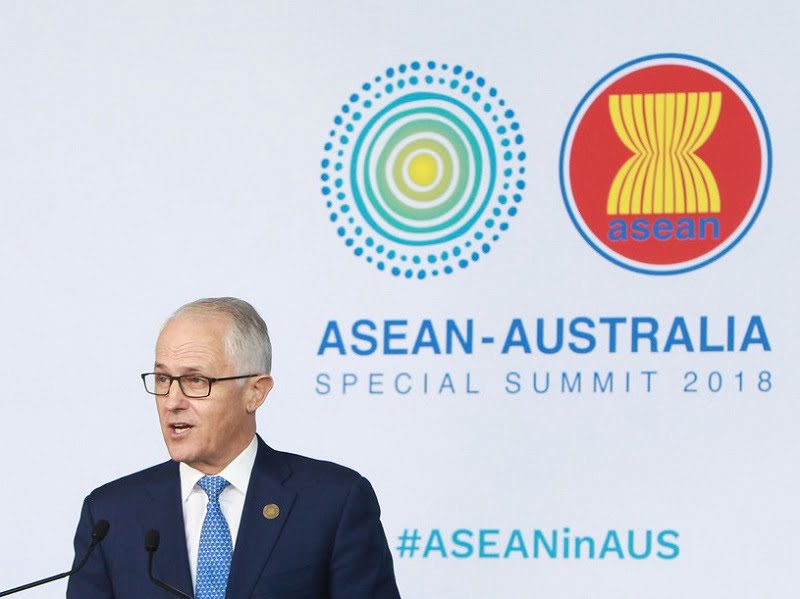Delegates at the recent ASEAN-Australia Business Summit 2018 have reported on how Australia can better engage with its $2.7 trillion trading partner.
ASEAN is predicted to be the globe’s fourth biggest economy by 2030 (its currently running fifth) and Australia’s future dealings with ASEAN are crucial.
Delegates to the Summit held in March, have had their recommendations collected in a report for consideration by ASEAN and Australian leaders.
The Business Summit in the words of summit rapporteurs, Chua Sock Koong, the group chief executive office of Singtel and Mark Vassella, CEO of BlueScope, saw “our shared region transforming at an unprecedented scale and pace.”

ASEAN and Australian businesses are increasingly demanding access to high quality resources, productivity enhancing digital technology and a workforce equipped deal with the rapid pace of change,” the rapporteurs said in the report.
“This requires a massive investment in fit-for-purpose infrastructure, human capital and research and development.
“The time is ripe for Australia and ASEAN to make the most of our comparative advantages Australia and increase cooperation and knowledge sharing between governments, greater collaboration on technology development and mutual investment in each other’s economies,” they said.
The shock of the fourth industrial revolution on workforces in Australia and ASEAN was raked over by a delegate roundtable that discussed the effects of digitisation of manufacturing and greater automation.
That shock is coming sooner rather than later, with the World Economic Forum reporting that by 2020 more than a third of the core skill sets needed in most occupations would consist of skills not considered crucial today.
Manufacturing accounts for an average 16 per cent of GDP in ASEAN countries compared to seven percent in Australia.
This makes ASEAN more vulnerable to workforce and social disruption through increased automation, and also means ASEAN country workforces will require dramatic upskilling to meet the needs of advanced manufacturing and industry 4.0 demands.
The report recommended setting in place more support for education and vocational training in digital technologies, as well as more collaboration between ASEAN and Australian research institutions such as Australia’s CSIRO and Singapore’s A*STAR to develop and adapt to Industry 4.0 and advanced manufacturing.
The report also recommended improving linkages between Australian and ASEAN businesses that helped them leverage digital technologies. Expanding the ASEAN SME portal to include Australia-ASEAN business relations was suggested.
ASEAN is the fastest growing internet market in the world, according to Google with 3.8 million new users coming onto the net every month, and as such presents a tremendous opportunity for the digital transformation of services.
In Australia the digital services opportunity is also very large with McKinsey estimating that digital technology could hike Australia’s GDP by about 10 per cent by 2025.
Getting to a world of major digital service growth is a people problem for both Australia and ASEAN and delegates recommended a range of measures.
These included making sure curriculums had a STEM focus and that increased female participation in STEM was encouraged; working on mutual recognition of educational and professional qualifications and supporting reskilling of existing workforces.
There was also a call for better tech finance connections across the region with the suggestion of establishing an association of venture capitalists for the ASEAN region.
Digital services could be used to help with financial inclusion and to encourage more diverse workforces while consistent digital trade standards should be encouraged across cyber, IT management and cloud computing and emerging technologies such as blockchain.
On the all-important cyber front, delegates recommended more official mechanisms for Australia-ASEAN cooperation on cyber security.
Australia has ambitions to become something of a breadbasket for Asia and Agri-food supply chain logistics were mulled over by delegates.
Getting food trade with ASEAN flowing freely is vital with 22 per cent of Australia’s global agricultural and fisheries exports going to the region in 2016-17 and an estimated 96 per cent of imports entering ASEAN tariff free by 2020, up from 67 per cent due to the AEAN-ANZ free trade deal coming online.
Roundtable delegates said improvements were needed in agri-food technology collaboration and that this could include extending Australia’s CRC model across ASEAN.
Other recommendations included establishing an inquiry into ASEAN regional supply chains; creating an ASEAN-Australia single window into tax and customs; building a database of priority infrastructure projects to help reduce infrastructure deficits; improving capital allocation to bridge the rural-urban divide in production and markets.
Do you know more? Contact James Riley via Email.

